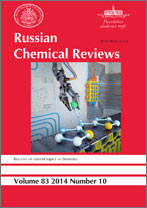|
This article is cited in 3 scientific papers (total in 3 papers)
Adducts of proteins and water-soluble poly(alkylene oxides)
I. N. Topchievaa, N. V. Efremovab, B. I. Kurganovb
a M. V. Lomonosov Moscow State University, Department of Chemistry
b A.N. Bach Institute of Biochemistry, Russian Academy of Sciences, Moscow
Abstract:
The review is devoted to methods for the modification of proteins by water-soluble diphilic block-copolymers of ethylene and propylene oxides and also to the properties of the resulting polymer–protein adducts. Two principal classes of such adducts are examined: conjugates obtained by forming covalent bonds between the protein and the polymer and non-covalent complexes. It is shown that the amphiphilic nature of the polymer chains gives rise to a series of new properties of the conjugates with the block-copolymers, such as the ability to be translocated into cells, the ability to solubilise insoluble biologically active compounds, the ability to serve as agents transporting the latter, and also the ability to interact with surfactants of different chemical nature. The bibliography includes 50 references.
Received: 23.11.1994
Citation:
I. N. Topchieva, N. V. Efremova, B. I. Kurganov, “Adducts of proteins and water-soluble poly(alkylene oxides)”, Usp. Khim., 64:3 (1995), 293–307; Russian Chem. Reviews, 64:3 (1995), 277–290
Linking options:
https://www.mathnet.ru/eng/rcr1226https://doi.org/10.1070/RC1995v064n03ABEH000150 https://www.mathnet.ru/eng/rcr/v64/i3/p293
|


| Statistics & downloads: |
| Abstract page: | 92 |
|





 Contact us:
Contact us: Terms of Use
Terms of Use
 Registration to the website
Registration to the website Logotypes
Logotypes








